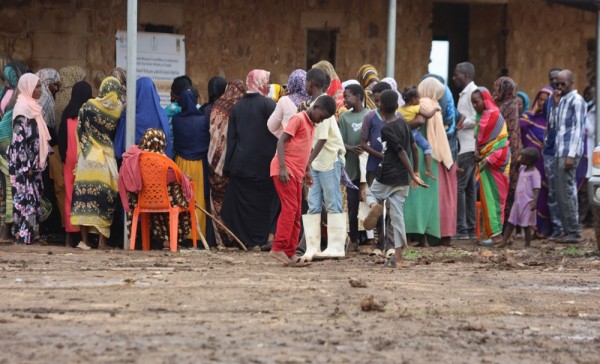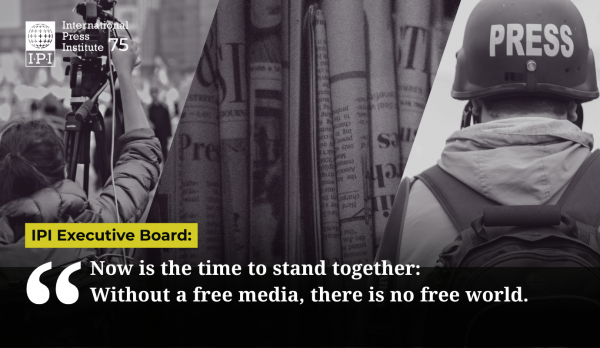It’s been just over a week since the military seized power in Myanmar, reversing the country’s transition to democracy and posing a grave threat to press freedom. The impact is already being felt on the country’s media, including the multimedia news organization Mizzima, which has already changed its headquarters and moved its heavy broadcasting equipment three times.
“Our work is to be able to broadcast and publish in whatever situation”, Soe Myint, the editor-in-chief and founder of Mizzima, said at an online press briefing organized by the International Press Institute (IPI) on February 8. In the briefing, Myint shared his thoughts on the current situation in Myanmar and the threats media organizations and journalists are facing amid a hostile climate. A total of 78 journalists and editors from almost 30 countries registered to attend the briefing, and over 60 attended.
According to Myint, the coup of February 1 was not completely unexpected. The general election last November, in which the Aung San Suu Kyi-led National League for Democracy (NLD) party secured 83 percent of the vote, led to strong resistance in the military after the military-backed Union Solidarity and Development Party was heavily defeated. Military officials claimed that there had been large-scale voter fraud. On February 1, just ahead of the swearing in of the new Parliament, the military carried out the coup, arrested Suu Kyi, cut off all internet and phone connections and took over power. “We were not surprised. We were prepared”, Myint said.
Myint said that Mizzima had stored a satellite dish, imported from Thailand, to continue its broadcasting. “Internet and telephones are important but we are used to and prepared to work without them”, Myint said. As the internet was cut off, he and his colleagues used SMS messages, CDs and DVDs to disseminate news. Myint explained that Mizzima was the third-largest media in the country with a daily audience of millions of people who could not be denied latest news.
Still, journalists need to be very careful. For their own safety many of Mizzima’s journalists have gone “underground”. Myint himself has moved several times. The last time was yesterday afternoon when he changed his location. Changing location regularly is the best way to make sure that the military won’t get a chance to block us from broadcasting, Myint said.
The situation is worst for journalists reporting on the streets. To try to avoid attacks and harassment, reporters need to keep a low profile. Instead of big, professional cameras, journalists use their mobile phones to ensure that they won’t be recognized, Myint said. Still, there have been several reports of cases in which journalists have been harassed while covering the protests. Freelance journalist Ko Thurein Kyaw was hospitalized after he was attacked while on assignment in Yangon. Myint’s colleagues reporting from Myanmar’s capital, Naypyidaw, have been followed by the intelligence services.
Echoes of 1988
Myanmar was under military control for decades until 2011 when the country took small steps towards civilian rule. In the last few years, the civilian leader and Noble Prize-winner Suu Kyi has been the face of a more democratic country.
Myint was 21 years old during Myanmar’s last military coup in 1988 and remembers its effects well. He said that, back then, just like now, people started to protest, and everyone shared the same goal: to fight for democracy and human rights.
Despite many similarities between 1988 and 2021, Myint said a lot has also changed. “Even though young people are taking part this time as well, they are smarter than our generation was back in 1988. They know what to do when the internet is down and create new ways to communicate. They move quickly”, Myint said, emphasizing his trust in the younger generation’s ability to fight for democracy. These dynamics can be seen in other parts of Asia too, such as in Hong Kong and Thailand, where young people have taken to the streets in the name of justice and freedom. “You messed with the wrong generation”, Myint said with regard to the military.
Still, the situation is not easy. The military in Myanmar is a strong institution, Myint said. “They have been trained to crackdown on technologies and they know exactly where the protestors are. They monitor social media very closely and confuse people. I am worried how long protests will be able to go on.”. He thinks that attacks on the media might rise, too. So far, a few activists have been arrested and Myint said that it is likely that reporters will be arrested as well. “They will come against anyone supporting the news and spreading information.”
International support remains crucial
Because the media’s ability to cover the coup and its effects are limited, Myint was happy to highlight the support his organization has received from its audience during the coup. “We were getting calls after calls from the public saying they want to send us photos, videos and other information of what is happening”, he said. Thanks to social media, that kind of participation is something totally different when compared to the year 1988.
Myint hopes that this time the military takeover won’t last long. One way to try to avoid that is to ensure continuous communication between the people in Myanmar and the international community. “I wish that the media outside the country supports the democratic forces, the independent media and journalists here”, Myint said adding that all support, whether political or moral, is more than welcome.
The coup is also having a severe effect on the financial sustainability of Myanmar’s independent media, who were already suffering under COVID-19. Myint said that media in Myanmar relied on the international community and donors for their survival. “We don’t know how to pay salaries to my fellow colleagues since all sponsors and advertisers were stopped from February 1.”



